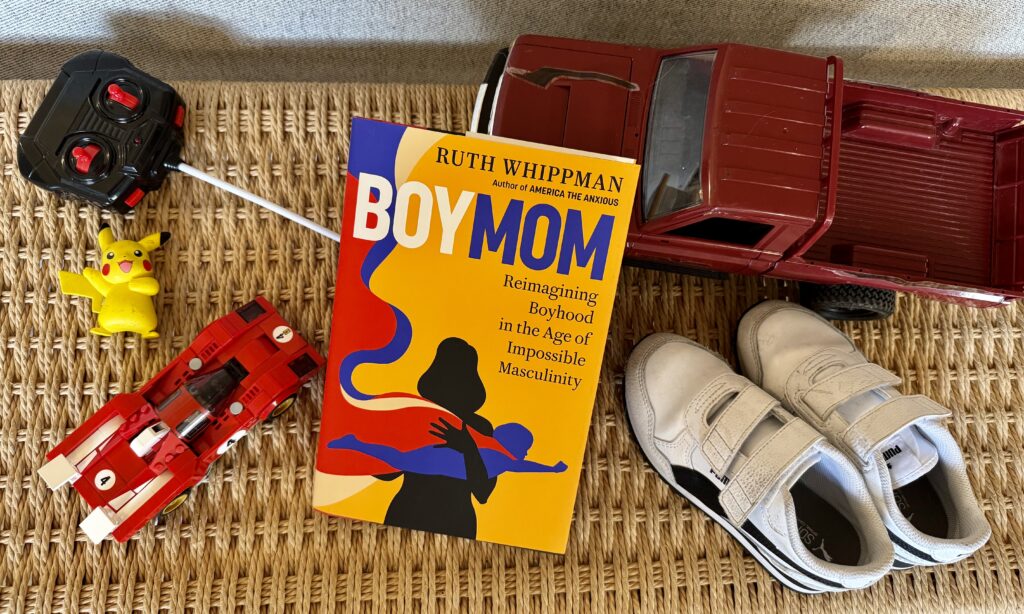Today, my son did all of the following:
- Ran around the house in circles, throwing off his clothes while screaming, “Eeeeeeeeeeh!”
- Had all five of his remote control cars chasing the dog while laughing maniacally.
- Gave me a hug and told me he loved me.
Balancing the chaos and sweetness that is my four-year-old son has been an exercise in managing my anxiety. While my friends with daughters tell tales of going to Broadway shows together or having parties at a local tea shop, I can barely get my son to sit still for chips at Chipotle. As someone who never wanted to engage in gender stereotypes, I see these mother-daughter duos and wonder what I am doing wrong.
Meanwhile, as a teacher of adolescents, I saw in my male* students a terrifying future for my son. I am shocked at the levels at which girls are outperforming boys in school. These boys avoided talking about emotions, only interacting with one another in various forms of sarcasm tinged with language of violence (“You’re killing it!” “Let’s dominate that team!”). When I asked these young men to share their fears in a private journal, they expressed the pressures of masculinity, their intense self-doubt, and their inability to share their feelings with peers for fear of mockery.
I am a feminist, an ally, a firm supporter of #MeToo. Like all women, I have my own tales of horror in our patriarchal, misogynistic society. So am I, by advocating for my son, ignoring the needs of women everywhere who also must contend with an unjust world?
I am so fortunate to have discovered Ruth Whippman’s memoir/treatise BoyMom: Reimagining Boyhood in the Age of Impossible Masculinity. Like me, she is raising a son (sons) in the era of #MeToo. As she writes in her introduction:
“Everywhere I turned inside my own brain I found contradiction and hypocrisy. In the fevered, absolutist climate of #MeToo, it was hard not to see men as the enemy. The sheer volume of evidence of male bad behavior was impossible to deny. I was angry with men and boys, horrified at the harm they had caused. But I was the mother of two of them. I was growing one inside my own body. Did my feminist principles require me to condemn the entire gender that included my own children? I feared what it would do to my sons and other boys psychologically, to grow up hearing that who they were was inherently toxic, their sexuality so potentially harmful.”
Disoriented, I veered wildly between disgust and defensiveness. While the feminist part of me yelled “Smash the patriarchy!” the mother part of me wanted to wrap the patriarchy up in its blankie and read it a story.
I inhaled Whippman’s words as she described a confusion that so closely mirrored my own. Each chapter of her book is a study of males—not just toddlers, but pre-teens, adolescents, and men in their early twenties. Soon, I found myself explaining to others the science that disproves girls are more “emotional” than boys and quoting the studies that prove baby boys are often neglected compared to girls. Whippman speaks to Dr. Darica Narvaez, professor emerita of psychology at Notre Dame University, who says, “We have an epidemic of undercared-for boys. No wonder we are seeing all this toxic masculinity when they grow up…Boys need more care than girls and they get less. People expect boys to be tough and resilient and independent, so without even thinking about it, mothers are less responsive to them. We push boys out.” Consider the thoughtful television shows and books designed for “girls” (talking about feelings) compared to the frenetic shows designed for boys, which usually include shouting and machines. It seems as if the world is preparing my son to grow into an emotionally-stagnant monster.
Whippman’s interviews—with self-professed “incels” and a whole cadre of scientists, psychologists, and researchers—gave me some guidance on how to navigate my son’s upbringing, how to turn him into the kind of man (if he chooses to identify that way) I hope he will become. I have given countless copies of this book to the harried mothers of boys I know and will continue to do so. I feel so grateful for this text, grateful to know that I am not the only feminist mom trying to do right by not just her own sons, but the world around her.
As I finish typing this, my son cuddles my lap, begging for kisses all while declaring his love for me.There’s hope for our sons yet.
*gender is a construct!

